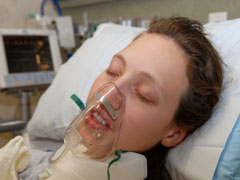Canada's Critically Ill H1N1 Patients Typically Young and Previously Healthy
New studies led by researchers in Canada and Mexico have determined that patients who require critical care due to 2009 influenza A(H1N1) infection are generally young people with few major underlying medical illnesses.
Sunnybrook Health Sciences Centre's Dr. Robert Fowler is the senior author on two studies – one studying patients in Mexico and a second studying patients from Canada. Both studies appear in this week's online issue of the Journal of the American Medical Association (JAMA.)
The Canadian study involved 215 critically ill adult and pediatric patients with 2009 influenza A (H1N1) infection admitted to 38 adult and pediatric intensive care units (ICUs) in Canada between April 16 and August 12, 2009. The study found that patients who became critically ill from H1N1 were young (the average age was 32 years), previously healthy, more often female, and were comprised of a disproportionate number of Aboriginal and First Nations Canadians.
Patients with H1N1 infection-related critical illness experienced symptoms for an average of four days before going to hospital, but quickly worsened and required transfer to an ICU and a breathing machine within 24 hours of presenting to hospital. Subsequently they required specialized life support for approximately two weeks, many for much longer.
With this degree of support, over 80 per cent of patients survived. Patients who died were more likely to have higher severity of illness at presentation to hospital. Although this overall population was young, older patients who got sick were at a higher individual risk of death.
In Mexico, there appeared to be an even greater pressure placed upon the health care system due to large numbers of critically ill patients. Patients presented to hospital later in their illness, fewer were able to receive early treatment with neuraminidase inhibitors such as oseltamivir, and outcomes were worse – at 60 days after critical illness onset, 40 per cent of patients had died.
"These findings are significant as they give us an indication of the H1N1 patient population we need to manage and how this group could benefit most from certain medical interventions," says Dr. Robert Fowler, Critical Care Physician at Sunnybrook and Assistant Professor in the Department of Medicine at the University of Toronto. "It is important to highlight that although these patients require aggressive life support and rescue therapies, with early treatment we found that most patients can be supported through their critical illness."
This study was funded and supported by the Canadian Institute for Health Research (CIHR), the Public Health Agency of Canada, the Ontario Ministry of Long-term Care, and the Heart and Stroke Foundation of Canada.
PDF / View full media release »


